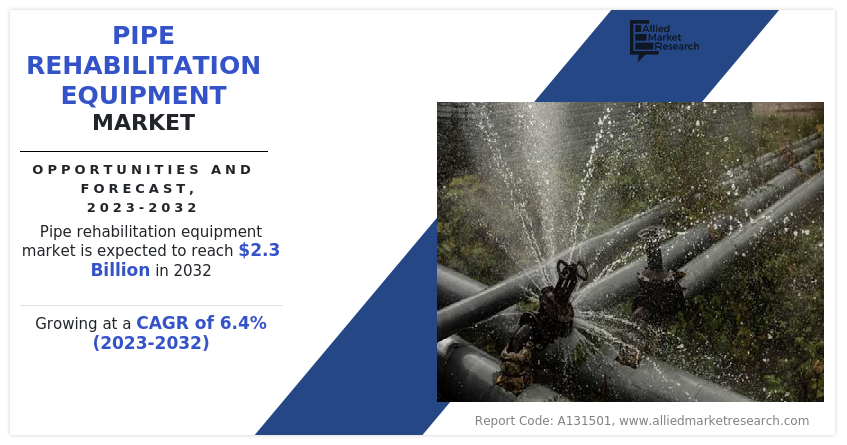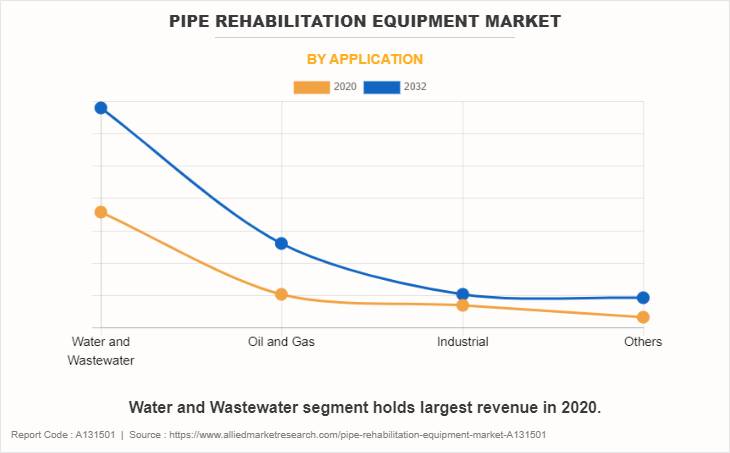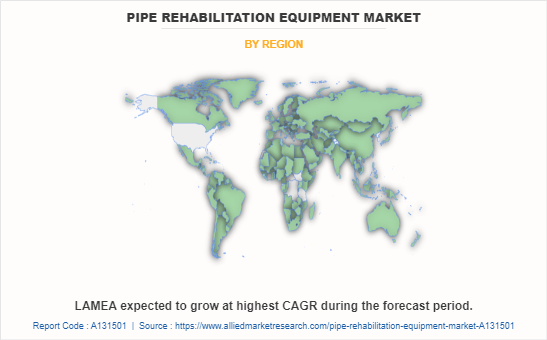Pipe Rehabilitation Equipment Market Research: 2032
The Global Pipe Rehabilitation Equipment Market Size was valued at $1.1 billion in 2020, and is projected to reach $2.3 billion by 2032, growing at a CAGR of 6.4% from 2023 to 2032.
Pipe rehabilitation equipment is a term used to describe machinery used to repair, refill, or enhance the quality of pipelines that have suffered damage, corrosion, or decoration. These machinery solutions are designed to restore the performance and integrity of pipelines with the least amount of excavation or replacement needed. They comprise several techniques, such as trenchless technology, cure in place CIPP lining, pipe breaking, robotic system, and other repair materials, all of which add to the availability of sustainable and inexpensive solutions for maintaining important infrastructure.
Market Dynamics
The pipe rehabilitation industry has expanded due to the rise in infrastructure improvement projects. As towns and communities grow, underground utility network improvements and restorations become more frequent. Traditional methods of replacement and maintenance, such as changing out and removing entire pipe sections, take a lot of time and money. It provides a useful and affordable alternative that barely disturbs the neighbors. As subsurface infrastructure ages, it is projected that demand for pipe rehabilitation is expected to increase further in the near future. For instance, Insituform offered the city of Harrisburg, Pennsylvania, a wastewater restoration solution in October 2022. This undertaking is anticipated to be finished in phases. Three kilometers of interceptor sewer is projected to be repaired using a trenchless technique called "cured-in-place pipe repair." This approach differs from the conventional approach in that it fixes aging sewer lines using no-dig technology. Like this, Insituform Technologies, a subsidiary of Aegion Corporation, signed a $5 million contract to renovate aging wastewater pipelines in Canada's Western Canada in September 2020. Therefore, these initiatives fuel the market's expansion.

However, in developing nations, a lack of human resources and skilled workers prevents the market from growing. In addition, most people in underdeveloped nations think it is wasteful to invest in infrastructure based on pipe rehabilitation. A further increase in project costs is caused by the usage of pipe rehabilitation. In addition, the up-front expense of purchasing and implementing pipe rehabilitation equipment market forecast, particularly for smaller businesses or governments with restricted budgets, is a major factor in the market's slow growth.
Moreover, with the rise in urbanization and industrialization of emerging nations, construction activities have increased. In addition, growth in the need for construction and infrastructure projects is the main factor driving the market. The installation of new infrastructure and the restoration of existing pipes for a better sewage system are both required by the continuously expanding residential and non-residential building sectors. In addition, there is a considerable demand for pipe rehabilitation equipment to install cured-in-place liners, burst old pipes while bringing in new ones, seal leaks, remove obstructions, and reinforce weak places. This benefit increases the need for pipe rehabilitation equipment, creating significant opportunities for the market for pipe rehabilitation equipment market growth in emerging nations.
Furthermore, several commodities, including food items, oil, and gas, saw a surge in price due to the Russia-Ukraine conflict. With supply chain interruptions, there are now more expensive shipping costs, fewer available containers, and less warehouse space. Since there have been delays in shipments and congestion, certain ports have been closed, and orders are being retracted, which influences industry and consumers globally. The decline in investor confidence has also increased stock market volatility. Economic instability has risen due to the strained commercial ties between Russia, Ukraine, and their different trading partners. Hence, all such factors have reduced export possibilities.
Segmental Overview
The pipe rehabilitation equipment market is segmented into type, pipe diameter, application, and region. By type, the market is categorized into pipe bursting equipment, cured-in-place-pipe (CIPP) lining equipment and others. By pipe diameter, the market is divided into small, medium, and large. By application, it is classified into water and wastewater, oil & gas, industry and others.
By type: Based on type market is divided into pipe bursting equipment, cured in place (CIPP) lining equipment and other. To repair a sewer line without digging a trench, a technique called pipe bursting is used. This method entails bursting and enlarging the existing underground sewer line while also replacing it with new high-density polyethylene (HDPE) pipes. No additional chemicals or contaminants are needed for pipe bursting. In addition, Cured-in-Place-Pipe Lining (CIPP) is a trenchless sewer building method. It involves less digging and takes far less time to complete than other sewer repair procedures. Furthermore, the other pipe rehabilitation equipment is slipping lining, spray lining, fold and form liners are considered under this segment.
Cured in place (CIPP) lining equipment is expected to exhibit the largest revenue contributor during the forecast period and expected to exhibit the highest CAGR share in the type of segment in the pipe rehabilitation equipment industry during the forecast period.
By pipe diameter: The market is divided into small, medium and large. A demand for effective water distribution, sewage system, and utility networks is created by the expansion of metropolitan areas and increased deployment in densely populated areas. In addition, many medium-diameter pipelines were aged and in need of upgrading, particularly in industries like municipal water delivery, wastewater management, and industrial processes. Furthermore, many large diameter pipelines used for transportation water, wastewater and various fluids were aging and required rehabilitation to extend their services life and ensure safety operation.
The medium segment is expected to be the largest revenue contributor during the forecast period, and the small segment is expected to exhibit the highest CAGR share in the pipe diameter segment in the pipe rehabilitation equipment market during the forecast period.

By application: The market is divided into water & wastewater, oil & gas, chemicals, and others. Infrastructure and water are increasingly in demand due to an increase in urbanization and the rate of population expansion. To address problems like leaks, corrosion, deterioration, and capacity restrictions in water and wastewater pipelines, pipe rehabilitation equipment must also be installed due to urbanization, the requirement for clean water supply, and the necessity for wastewater management systems. In addition, the oil & gas industry is the highest consumer of pipe rehabilitation equipment, mainly owing to the high demand for pipe rehabilitation systems from nearly all its activities. Furthermore, demand for chemical industry pipe rehabilitation equipment is anticipated to rise during the forecast periods due to increased urbanization and industrialization. Moreover, the other pipe rehabilitation equipment is municipal, mining, agriculture and Irrigation are considered under this segment.
Water and wastewater segments are expected to be the largest revenue contributor during the forecast period, and the other segment is expected to exhibit the highest CAGR share in the application segment in the pipe rehabilitation equipment market during the forecast period.

By region: The pipe rehabilitation equipment market is analysed across North America, Europe, Asia-Pacific, and LAMEA. In 2022, Asia Pacific held the highest revenue in pipe rehabilitation equipment market share. And LAMEA is expected to exhibit the highest CAGR during the forecast period.
Competition Analysis
The key companies profiled in the pipe rehabilitation equipment market report include,Trelleborg Seals & Profiles, Picote Group, Dancutter, Vortex Companies, NordiTube Technologies, Pow-R Mole Trenchless Solutions, HammerHead, Aegion Corporation, Relining Group and Waterline Renewal Technologies.
Major companies in the market have adopted acquisition, product launch, business expansion, and other strategies as their key developmental strategies to offer better products and services to customers in the Pipe rehabilitation equipment market.
Key Benefits For Stakeholders
- This report provides a quantitative analysis of the market segments, current trends, estimations, and dynamics of the pipe rehabilitation equipment market analysis from 2020 to 2032 to identify the prevailing pipe rehabilitation equipment market opportunities.
- The market research is offered along with information related to key drivers, restraints, and opportunities.
- Porter's five forces analysis highlights the potency of buyers and suppliers to enable stakeholders make profit-oriented business decisions and strengthen their supplier-buyer network.
- In-depth analysis of the pipe rehabilitation equipment market segmentation assists to determine the prevailing market opportunities.
- Major countries in each region are mapped according to their revenue contribution to the global market.
- Market player positioning facilitates benchmarking and provides a clear understanding of the present position of the market players.
- The report includes the analysis of the regional as well as global pipe rehabilitation equipment market trends, key players, market segments, application areas, and market growth strategies.
Pipe Rehabilitation Equipment Market Report Highlights
| Aspects | Details |
| Market Size By 2032 | USD 2.3 billion |
| Growth Rate | CAGR of 6.4% |
| Forecast period | 2020 - 2032 |
| Report Pages | 210 |
| By Type |
|
| By Pipe Diameter |
|
| By Application |
|
| By Region |
|
| Key Market Players | Picote Group, HammerHead Trenchless Equipment, Dancutter, Trelleborg Seals & Profiles, Waterline Renewal Technologies, Inc., Vortex Companies, NordiTube Technologies AB, Pow-R Mole Trenchless Solutions, Aegion Corporation, Relining Group |
Analyst Review
There is an increase in demand for pipe rehabilitation equipment in the oil & gas industries, which propels the growth of the market. The market is anticipated to garner high revenues globally, with the development in automated regulation and control of pipes rehabilitation. Moreover, the increased investments in oil & gas extraction infrastructure in the North American countries including the U.S. and Canada drive the demand for pipe rehabilitation equipment, which in turn boosts the growth of pipe rehabilitation equipment market. The high demand from North America is satisfied by major manufacturers of industrial valves located in China, Germany, India, and others, which has resulted in significant growth of pipe rehabilitation equipment industry globally. In addition, the food & beverage processing industries have garnered high growth from the developing countries including Brazil, India, and others, which has surged the demand for pipe rehabilitation equipment.
??
The global pipe rehabilitation equipment market was valued at $1,113.9 million in 2020, and is projected to reach $2,266.1 million by 2032, registering a CAGR of 6.4% from 2023 to 2032.
The forecast period considered for the global pipe rehabilitation equipment market is 2022 to 2031, wherein, 2020 is the base year, 2022 is the estimated year, and 2032 is the forecast year.
The latest version of global pipe rehabilitation equipment market report can be obtained on demand from the website.
The base year considered in the global pipe rehabilitation equipment market report is 2020.
The major players profiled in the pipe rehabilitation equipment market include Trelleborg Seals & Profiles, Picote Group, Dancutter, Vortex Companies, NordiTube Technologies, Pow-R Mole Trenchless Solutions, HammerHead, Aegion Corporation, Relining Group and Waterline Renewal Technologies.
The top ten market players are selected based on two key attributes - competitive strength and market positioning.
The report contains an exclusive company profile section, where leading companies in the market are profiled. These profiles typically cover company overview, geographical presence, market dominance (in terms of revenue and volume sales), various strategies and recent developments.
Loading Table Of Content...
Loading Research Methodology...



